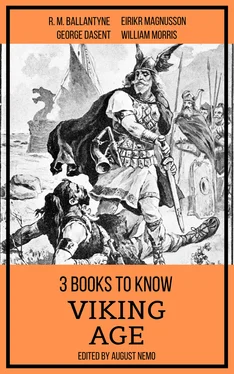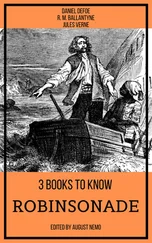“That is true. Go on.”
“Well, it seems to me that the foundation of our settlement is not good. It is true that some of us have our wives here, and there is, besides, a sprinkling of young girls, who are being courted by some of the men; nevertheless it remains a stubborn truth that far the greater part of the men are those who came out with Thorward and me, and have left either wives or sweethearts in Norway and in Iceland. Now these may be pleased to remain here for a time, but it cannot be expected that they will sit down contentedly and make it their home.”
“There is truth in what you say, Karlsefin. Have any of your men spoken on that subject?”
“No, none as yet; but I have not failed to note that some of them are not so cheerful and hearty as they used to be.”
“What is to prevent you making a voyage to Iceland and Norway next spring,” said Leif, “and bringing out the wives and families, and, if you can, the sweethearts of these men?”
Karlsefin laughed heartily at this suggestion. “Why, Leif,” he said, “has your sojourn on the barren coast of Greenland so wrought on your good sense, or your feelings, that you should suppose thirty or forty families will agree at once to leave home and kindred to sail for and settle in a new land of the West that they have barely,—perhaps never—heard of; and think you that sweethearts have so few lovers at home that they will jump at those who are farthest away from them? It is one thing to take time and trouble to collect men and households that are willing to emigrate; it is another thing altogether to induce households to follow men who have already emigrated.”
“Nay, but I would counsel you to take the men home along with you, so that they might use their persuasions,” returned Leif; “but, as you say, it is not a likely course to take, even in that way. What, then, do you think, is wisest to be done?”
“I cannot yet reply to that, Leif. I see no course open.”
“Tell me, Karlsefin, how is it with yourself?” asked Leif, looking earnestly at his friend. “Are you content to dwell here?”
Karlsefin did not reply for a few seconds.
“Well, to tell you the truth,” he said at length, “I do not relish the notion of calling Vinland home. The sea is my home. I have dwelt on it the greater part of my life. I love its free breezes and surging waves. The very smell of its salt spray brings pleasant memories to my soul. I cannot brook the solid earth. While I walk I feel as if I were glued to it, and when I lie down I am too still. It is like death. On the sea, whether I stand, or walk, or lie, I am ever bounding on. Yes; the sea is my native home, and when old age constrains me to forsake it, and take to the land, my home must be in Iceland.”
“Truly if that be your state of mind,” said Leif, laughing, “there is little hope of your finally coming to an anchor here.”
“But,” continued Karlsefin, less energetically, “it would not be right in me to forsake those whom I have led hither. I am bound to remain by and aid them as long as they are willing to stay—at least until they do not require my services.”
“That is well spoken, friend,” said Leif. “Thou art indeed so bound. Now, what I would counsel is this, that you should spend another year, or perhaps two more years, in Vinland, and at the end of that time it will be pretty plain either that the colony is going to flourish and can do without you, or that it is advisable to forsake it and return home. Meanwhile I would advise that you give the land a fair trial. Put a good face on it; keep the men busy—for that is the way to keep them cheerful and contented, always being careful not to overwork them—provide amusements for their leisure hours if possible, and keep them from thinking too much of absent wives and sweethearts—if you can.”
“If I can,” repeated Karlsefin, with a smile; “ay, but I don’t think I can. However, your advice seems good, so I will adopt it; and as I shall be able to follow it out all the better with your aid, I hope that you will spend next winter with us.”
“I agree to that,” said Leif; “but I must first visit Greenland in spring, and then return to you. And now, tell me what you think of the two thralls King Olaf sent me.”
Karlsefin’s brow clouded a little as he replied that they were excellent men in all respects—cheerful, willing, and brave.
“So should I have expected of men sent to me by the King,” said Leif, “but I have noticed that the elder is very sad. Does he pine for his native land, think ye?”
“Doubtless he does,” answered Karlsefin; “but I am tempted to think that he, like some others among us, pines for an absent sweetheart.”
“Not unlikely, not unlikely,” observed Leif, looking gravely at the ground. “And the younger lad, Hake, what of him? He, I think, seems well enough pleased to remain, if one may judge from his manner and countenance.”
“There is reason for that,” returned Karlsefin, with a recurrence of the troubled expression. “The truth is that Hake is in love with Bertha.”
“The thrall?” exclaimed Leif.
“Ay, and he has gone the length of speaking to her of love; I know it, for I heard him.”
“What! does Karlsefin condescend to turn eavesdropper?” said Leif, looking at his friend in surprise.
“Not so, but I chanced to come within earshot at the close of an interview they had, and heard a few words in spite of myself. It was in summer. I was walking through the woods, and suddenly heard voices near me in the heart of a copse through which I must needs pass. Thinking nothing about it I advanced and saw Hake and Bertha partially concealed by the bushes. Suddenly Hake cried passionately, ‘I cannot help it, Bertha. I must tell you that I love you if I should die for it;’ to which Bertha replied, ‘It is useless, Hake; neither Leif nor Karlsefin will consent, and I shall never oppose their will.’ Then Hake said, ‘You are right, Bertha, right—forgive me—.’ At this point I felt ashamed of standing still, and turned back lest I should overhear more.”
“He is a thrall—a thrall,” murmured Leif sternly, as if musing.
“And yet he is a Scottish earl’s son,” said Karlsefin. “It does seem a hard case to be a thrall. I wonder if the new religion teaches anything regarding thraldom.”
Leif looked up quickly into his friend’s face, but Karlsefin had turned his head aside as if in meditation, and no further allusion was made to that subject by either of them.
“Do you think that Bertha returns Hake’s love?” asked Leif, after a few minutes.
“There can be no doubt of that,” said Karlsefin, laughing; “the colour of her cheek, the glance of her eye, and the tones of her voice, are all tell-tale. But since the day I have mentioned they have evidently held more aloof from each other.”
“That is well,” said Leif, somewhat sternly. “Bertha is free-born. She shall not wed a thrall if he were the son of fifty Scottish earls.”
This speech was altogether so unlike what might have been expected from one of Leif’s kind and gentle nature that Karlsefin looked at him in some astonishment and seemed about to speak, but Leif kept his frowning eyes steadily on the ground, and the two friends walked the remainder of the road to the hamlet in perfect silence.
TREATS OF THE FRIENDSHIP and Adventures of Olaf and Snorro, and of Sundry Surprising Incidents.
––––––––

WE MUST NOW PASS OVER a considerable period of time, and carry our story forward to the spring of the third year after the settlement of the Norsemen in Vinland.
Читать дальше













